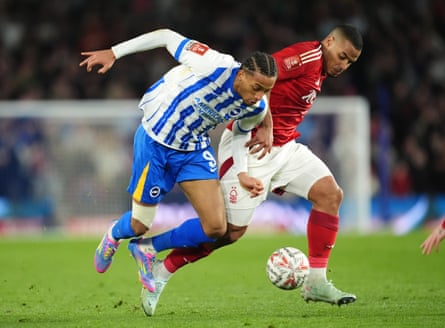Even as modern life takes over, history is everything in the FA Cup. The competition’s newfound disdain for replays allowed Nottingham Forest to become the first team to win three consecutive FA Cup penalty shootouts. History was made, novelty was witnessed, but in a setting that emphasised the traditions of the grand old Cup. After Exeter and Ipswich, fell Brighton, and so Forest matched the feat of the Moroccan army side FAR Rabat, who beat MC Oujda, Wydad Casablanca and Rachad Bernoussi on penalties in successive rounds to win the Coupe du Trone in 2007.
It was a game characterised by caution, reflecting both Forest’s habitual preference for a low block and Brighton’s wariness after losing 7-0 to Forest last month. But it also perhaps reflected how much both sides cared, a welcome, if retro, feature of the latter stages of the FA Cup this season.
Nuno applauds Nottingham Forest after reaching Wembley FA Cup semi
Defeat would have meant the loss of an opportunity that neither side could take lightly. Of the four sides involved in the first two quarter-finals, only one had won the FA Cup: Forest, who last won the Cup in 1959 when their opening goal was scored by Roy Dwight, Elton John’s cousin. This will be their first semi-final since 1991, when they beat West Ham.
Brighton may have been in two semis in the past six years, but there is no sense of them being sated. Success both for them and Forest remains an improbable dream; each step further up the mountain opens up new vistas of possibility. They are not desperately clinging to achievement, grasping desperately at each trophy to stave off the fear of failure, hoarding silverware like a gloomy dragon in an Anglo-Saxon epic, which is how it often seems for superclubs.
The sense of occasion, the yearning for a semi-final, was palpable and, as so often in the FA Cup, there was a self-awareness, the game played amid echoes of the competition’s past, as though conscious of its own history. One home fan had brought a cutout of the FA Cup, albeit one that, rather than being made of cardboard or plywood as it would have been in a Pathé clip, it was fashioned of foam and had an inflatable seagull dangling from it. There was even a homage to Ian Rush in the 1986 FA Cup final as Carlos Baleba’s flashed just wide and knocked over a remote-controlled camera.
But this was also a very contemporary occasion, and not just because of the pyrotechnics that cast this thoroughly modern stadium in the rolling Sussex hills in a cordite-scented haze just before kick-off. Only seven of the starting XIs were British, an obvious contrast to the 1959 final, when the greatest exoticism was supplied by Bill Whare, Forest’s Guernsey-born right-back.
That’s a curiosity that takes on greater significance when it is considered how many of them had played in World Cup qualifiers in the past week.
A total of 13 players from the two squads were involved in action outside of Europe. Seven of them travelled more than 10,000 miles in doing so. And one of them, Forest’s Chris Wood, travelled over 23,000 miles in helping secure New Zealand’s qualification with wins over Fiji and New Caledonia. A hip injury sustained in the latter of those kept the centre-forward out.

Brighton’s João Pedro and Nottingham Forest’s Murillo were on international duty together with Brazil. Photograph: Adam Davy/PA
The two managers, equally, were avatars of very modern types: Nuno Espírito Santo, a classic Portuguese pragmatist with an excitable backroom staff, and Fabian Hürzeler, a terrifyingly youthful German devotee of pressing football and loud swearing. They had both been sent off in the corresponding league fixture for their reactions to the sending-off of Morgan Gibbs-White.
skip past newsletter promotion
Sign up to Football Daily
Kick off your evenings with the Guardian’s take on the world of football
Privacy Notice: Newsletters may contain info about charities, online ads, and content funded by outside parties. For more information see our Privacy Policy. We use Google reCaptcha to protect our website and the Google Privacy Policy and Terms of Service apply.
after newsletter promotion
Perhaps the most modern aspect of all, though, was the presence of the two players on the respective right flanks: Yankuba Minteh for Brighton and Elliot Anderson for Forest. It was the ever-industrious Anderson who seemed to have his ankle hooked by the trailing arm of Kaoru Mitoma midway through the second half, only for Peter Bankes to overturn his initial call of penalty following a VAR review – another intrusion of the modern into the palimpsest.
Both were sold by Newcastle last summer, apparently for profit and sustainability regulations. It’s probably not great that there is an incentive for clubs to sell promising young local talent, like Anderson, that they have developed, and it’s certainly frustrating for Newcastle, but on the other hand, this might be an example of PSR ensuring a wider spread of talent than would otherwise be the case. It would be dangerous to draw too many conclusions from one season but the sense is this campaign has been that, Liverpool and the bottom three aside, the Premier League has been a far more level and competitive division than it has been for a decade.
And then a final modern twist: not a replay but extra time and penalties. And this season in the Cup, in shootouts Forest have been impeccable.
